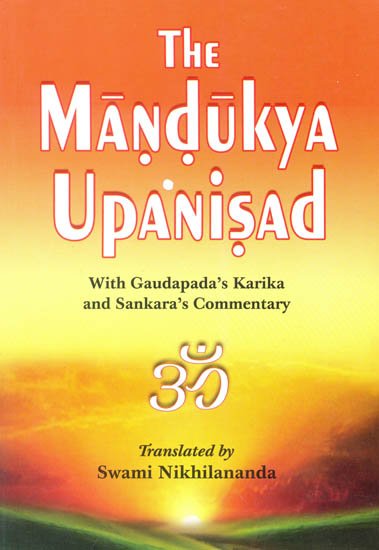Mandukya Upanishad (Gaudapa Karika and Shankara Bhashya)
by Swami Nikhilananda | 1949 | 115,575 words | ISBN-13: 9788175050228
This is verse 4.85 of the Mandukya Karika English translation, including commentaries by Gaudapada (Karika), Shankara (Bhashya) and a glossary by Anandagiri (Tika). Alternate transliteration: Māṇḍūkya-upaniṣad 4.85, Gauḍapāda Kārikā, Śaṅkara Bhāṣya, Ānandagiri Ṭīkā.
Mandukya Karika, verse 4.85
Sanskrit text, IAST transliteration and English translation
प्राप्य सर्वज्ञतां कृत्स्नां ब्राह्मण्यं पदमद्वयम् ।
अनापन्नादिमध्यान्तं किमतः परमीहते ॥ ८५ ॥prāpya sarvajñatāṃ kṛtsnāṃ brāhmaṇyaṃ padamadvayam |
anāpannādimadhyāntaṃ kimataḥ paramīhate || 85 ||85. What else remains for him to be desired when he has attained to the state of the Brāhmaṇa—a state of complete omniscience, non-duality and a state which is without beginning, end or middle?
Shankara Bhashya (commentary)
The1 state of the Brāhmaṇa signifies the state in which one is established in Brahman. The Śruti says, “This is the eternal2 glory of the Brāhmaṇa.” That state of Brāhmaṇa is free from beginning, end or middle. That is to say, that state of non-duality is free from the (illusory ideas of) creation, preservation and destruction. Having obtained the whole3 of omniscience, described4 above, i.e., the state of Brāhmaṇa, a non-dual state without beginning, end or middle, which is the same as the realisation of Self, the summum bonum of existence—what else remains for him to be desired? In other words, all other strivings become useless for him. It is thus said in Gītā, “He has nothing to gain by the activities (of the relative world).”
Anandagiri Tika (glossary)
The contention of the opponent that even a Knower of Brahman should observe the ritualistic duties of daily life is refuted by this Kārikā.
1 The state, etc.—He alone is the real Brāhmaṇa who has directly realised himself as Brahman.
2 Eternal glory—That is to say, this state is free from all modifications and changes, such as birth, death, etc.
3 Whole, etc.—Having realised that state one becomes totally omniscient. There is nothing else for him to know. It is because that state is the very essence of knowledge itself.
4 Described above—That is to say, Brahman is free from the four attributes or predicates referred to in Kārikā 83.
